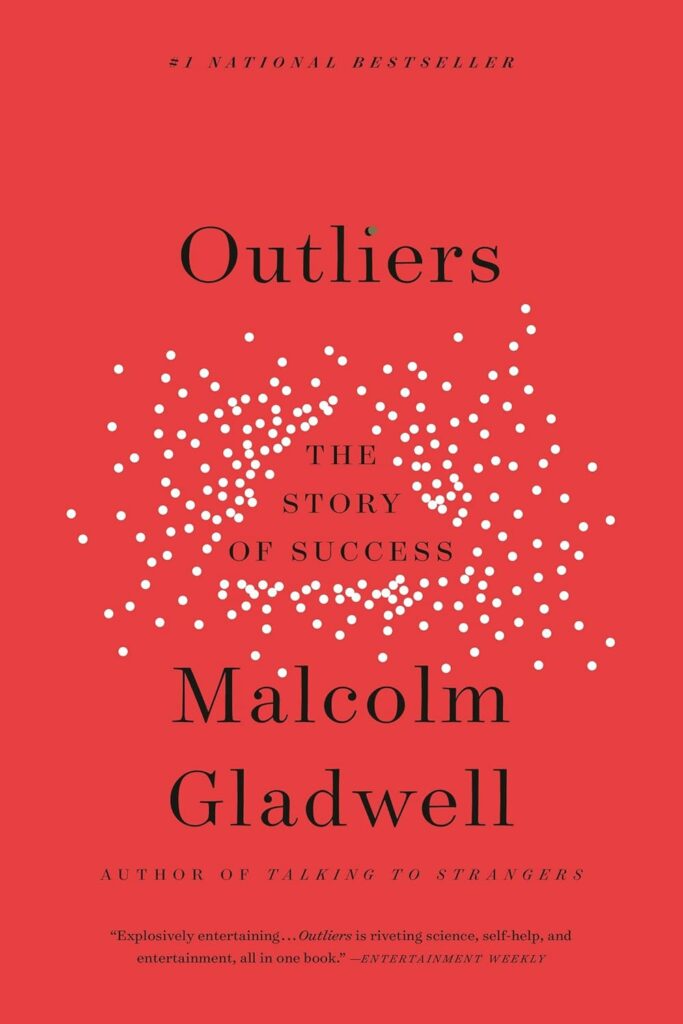
enjoyed reading Malcolm Gladwell’s “Outliers: The Story of Success”, and I’m thrilled to share my thoughts and insights with you. As someone deeply fascinated by the dynamics of success and how individuals rise to prominence, I’ve always been drawn to Gladwell’s works. His journalistic style, characterized by a profound depth and a unique narrative flair, brings an exceptional richness to the topics he explores. Gladwell, I believe, has a gift for making complex theories accessible and engaging, turning what might otherwise be dry analyses into compelling stories that captivate the reader’s imagination.
In this post, I’ll introduce you to one of his excellent books: ‘Outliers: The Story of Success’. My discussion of the book will proceed as follows: First, I provide a summary of “Outliers,” giving you a glimpse into Gladwell’s fascinating exploration of success.
Next, I’ll delve into some of the criticisms the book has received. Despite its wide acclaim, “Outliers” has not been without its detractors, and it’s important to consider these perspectives to fully appreciate the depth of Gladwell’s work. Finally, I’ll offer a series of thought-provoking book club questions designed to spark in-depth discussions.
Related: Best Outliers Quotes
Outliers Summary
Outliers: The Story of Success is Malcolm Gladwell’s insightful exploration of the factors that make successful people successful. The book discusses why some people achieve extraordinary success, while many others with similar skills and backgrounds struggle to achieve even average results. Through extensive research, Gladwell reveals an array of surprising truths about success that challenge traditional ways of thinking.
Malcolm also explores the role of luck and opportunity, as well as the often-overlooked importance of cultural heritage, family upbringing, and even geographical location in determining one’s success. With all these factors considered, Malcom emphasizes an important point which is that successful people are often those who have put in much more effort than their peers over long periods.
Photo: Amazon
Malcom illustrates this point with the example of Bill Gates and how the latter accumulated 10,000 hours of computer programming before his teenage years to give him an advantage when he launched Microsoft in 1975. Gladwell also discusses the concept of “the 10,000 Hour Rule” which states that with dedication and hard work, most people can become experts in their field if they put in 10,000 hours or more. He also reveals that intelligence, motivation, and even physical traits can all play a role in determining success.
Outliers: The Story of Success also provides many practical tips for aspiring successful people, such as taking advantage of available opportunities, working hard on what you excel at, and building relationships with those who can help further your goals. By dispelling myths around success and providing readers with tangible advice, Gladwell offers high hopes that ordinary individuals can reach extraordinary heights if given the right tools. This book is sure to inspire readers to strive for greatness and make their mark on the world.
Related: I Wish My Teacher Knew Summary
Critics of the Book
Critics of Outliers: The Story of Success have pointed out several issues with Gladwell’s argument. Some believe that his 10,000-hour rule oversimplifies the complex factors at play in achieving success. They argue that there are many other aspects to consider such as innate abilities and personal circumstances. Furthermore, there have been controversies surrounding Gladwell’s focus on success stories from privileged backgrounds, which some feel ignores the contributions of those who had fewer resources or opportunities but achieved great things through hard work alone.
Others have also criticized Gladwell’s reliance on anecdotes and observational evidence instead of empirical data. They question whether his conclusions are rooted in fact or if they are simply subjective interpretations. Moreover, some point out that while he can identify patterns that may lead to success, he does not provide enough empirical evidence to prove their validity.
Some have also argued that the book fails to address how class and race can factor into success stories. Critics suggest that the book ignores how systemic inequality and socio-economic differences create disparities between people from different backgrounds and how these can determine the level of access one has to resources and opportunities needed for success.
Additionally, critics note that there is no evidence presented to demonstrate how luck plays a role in creating positive outcomes for certain individuals over others with similar skill sets and ambition.
Overall, Outliers: The Story of Success is an interesting and thought-provoking read. It encourages readers to look beyond what is seen on the surface and question why some people are more successful than others. While there are flaws in Gladwell’s approach, his ideas challenge readers to explore the deeper factors behind success and motivate them to strive for their goals.
Outliers Book Club Questions
Here are some questions that might spark engaging and thought-provoking conversations among book club members:
- Exploring Individual Stories: Malcolm Gladwell presents numerous case studies to illustrate his points about success. Which story resonated with you the most, and why? How does it challenge or reinforce your preconceived notions about success?
- The 10,000-Hour Rule: Gladwell suggests that mastery in a field requires about 10,000 hours of practice. Discuss how this rule applies to well-known figures in various fields (artists, scientists, athletes). Can you think of personal examples where long-term dedication significantly impacted someone’s success?
- Role of Cultural Heritage and Family Upbringing: How do you think your cultural heritage and family upbringing have influenced your path to success or your definition of it? Can you identify any “cultural legacies” that have affected your approach to challenges and opportunities?
- Luck and Opportunity: Gladwell emphasizes the importance of being in the right place at the right time. Discuss instances in your life or in the lives of public figures where luck and opportunity played a pivotal role in achieving success. Does this change your perspective on hard work being the sole determinant of success?
- Reevaluating Success: Based on Gladwell’s arguments, do you think society’s traditional measures of success (wealth, job titles, accolades) are adequate? How would you redefine success, taking into account the factors Gladwell describes?
- Practical Advice for Aspiring Successful People: Gladwell provides practical tips for achieving success. Which advice did you find most compelling or actionable? How might you apply these insights to your personal or professional life?
- Critique and Counterarguments: While Gladwell’s insights are compelling, they have also faced criticism. What are some potential criticisms or limitations of Gladwell’s arguments? Can you think of counterexamples that challenge his conclusions?
- Impact on Education and Policy: Considering the factors that Gladwell identifies as contributing to success, what implications does this have for education policies or workplace practices? How might societies better foster environments where more individuals can achieve success?
- Reflection on Personal Effort and Success: Reflecting on your own experiences, discuss a time when you put in a significant effort to overcome a challenge or achieve a goal. Did you reach the “10,000-hour” mark in any skill or field, and what was the outcome?
Related: Talking to Strangers Summary
Final thoughts
Gladwell’s meticulous research and compelling narratives invite us to look beyond the surface of individual triumphs to understand the complex interplay of factors that pave the way for extraordinary accomplishments. From the significance of cultural backgrounds and the timing of opportunities to the critical role of dedication—as epitomized by the “10,000-Hour Rule”—Gladwell challenges us to rethink the essence of success.
The discussions around “Outliers” don’t just broaden our understanding; they also inspire a sense of optimism and possibility. By highlighting that success is often a product of advantages, some of which are within our control or influence, Gladwell encourages us to seek out and create opportunities for ourselves and others. This perspective is especially empowering for educators, parents, and mentors who play pivotal roles in shaping the environments that can foster success.
Critiques of “Outliers” serve as important reminders that success is a multifaceted concept, one that cannot be fully explained by a single theory or narrative. They encourage us to engage with Gladwell’s work critically, appreciating its insights while also considering its limitations. This balanced approach enriches our understanding and prompts deeper inquiry into the nature of achievement.








